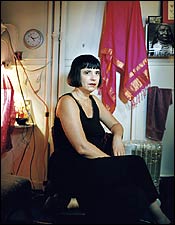
She’s a sexually frank female performer who’s used her phenomenal mainstream popularity to help women around the world. So why does she drive me crazy?
“It’s a little miracle,” the creator of The Vagina Monologues—now an international institution made up of road companies and charities—says of her runaway success. “One woman said, ‘I want to bring this to the Islamic world.’ A Native American woman said, ‘I want to bring this to the Indian country.’ It really happens in a grass-roots way.”
It’s Ensler’s most maddening quality: hubris masquerading as humility. And indeed, in Ensler’s Vagina Monologues follow-up, The Good Body, the stage is set with a photo collage showing Ensler all over the world, giving the sign of V for victory. The triumphant images are quickly belied by a confession: While The Vagina Monologues brought Ensler fame, Starbucks scones continued to be her undoing. As Ensler details her body anxiety and conjures body-haters she’s met all over the world, she lays blame on the usual suspects: capitalism and the Judeo-Christian patriarchy.
At The Good Body, I squirmed in my critic’s seat, a lone frowner in an audience of laughing, mostly older women. They were having a be-in; I desperately wanted to be-out. And why? Was it as simple as ungrateful-daughter syndrome—the gap between the so-called Second Wave feminists of the seventies (Ensler is 51), who took for granted the right to vote, and the so-called Third Wave feminists (I’m 28), who take for granted legal abortion?
That’s kind of how our phone conversation goes the following day. I tell Ensler I’m impressed that she’ll reveal something as sick as her ability to look at beggars in India and see only her own need to slim down, but that for me, her focus on victimization of women by men seems reductive. “I wish it was true that Third Wave women weren’t being beaten and violated and raped,” Ensler responds. “That would be really good news. But unfortunately that’s not true.”
Guilty and irritable, I hang up feeling like a teenager sent to my room. For six years, I’ve made a living reviewing plays; surely I can separate my observations from my emotions. But on the subway home, my date—a calm 29-year-old woman who had enjoyed The Vagina Monologues—and I quickly get worked up into a bratty frenzy. A former bulimic, my friend is aghast at what she regards as Ensler’s narcissistic, blithe treatment of eating disorders. By Union Square, we are startling fellow passengers with our righteous indignation. The same woman who makes so many women feel empowered has made us weirdly hysterical.
It’s the opposite of what Ensler clearly hopes to inspire: empathy. Ensler sets herself up as a vessel for women around the world, yet all I can see is her transforming real people into noble clichés (the powerful, wise African; the chubby, jolly Indian) and urgent, complex issues into causes for her V-Day empire. Then again, these are causes for which she’s raised $25 million.
Who but a monster could attack someone trying so hard to do good? She’s set it up like that: You’re with her or you’re against her—and all the violated women of the world. We may be on the same side, but I can’t be part of her revolution.